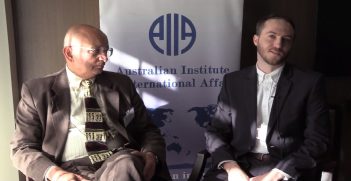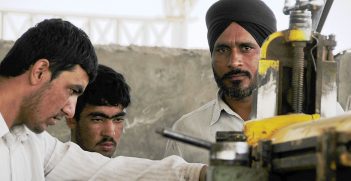Afghanistan-US: The Dealmaker’s No Deal

Donald Trump invited the Taliban to Camp David in early September to seal an Afghan peace deal. The cancellation of the meeting showed that the process was too rushed and that Trump still has much to learn about effective diplomacy.
President Donald Trump’s proposed secret Camp David meeting on 8 September with senior Taliban officials and an Afghan government delegation led by President Ashraf Ghani to strike an in-principle peace agreement would have been the deal of the century, had it gone ahead and been successful.
Emerging details suggest officials convinced Trump at the eleventh hour it was likely to be a highly embarrassing failure, and he cancelled on 5 September to avoid this, using continuing Taliban violence which killed a US serviceman in Kabul, as his excuse.
Trump’s determination to facilitate an end, or the beginning of the end, to the 18-year war in Afghanistan during his presidency, is a genuine commitment. Achieving that outcome has the support of his NATO-plus allies, including Australia.
Trump’s initiative to deliver a deal saw tough negotiations between the US and Taliban delegates in Doha during the past 12 months, with a proposed in-principle agreement reached early this month. Trump reportedly assessed this milestone as sufficient for the key players — the US, Taliban, and the Afghan government which had not been part of those negotiations — to meet, tweak and sign off as the springboard for a future peace agreement.
Ever the showman, Trump also saw the opportunity to broker this proposed agreement at Camp David in a way to demonstrate his self-acclaimed dealmaker credentials. Doing so would have at least matched the then magic of the Camp David Summit held in July 2000, at which President Clinton facilitated a meeting between Israeli Prime Minister and Palestine Chairman Yasser Arafat to seek to end the Israel-Palestine conflict.
Despite Trump’s opportunism, a successful meeting on 8 September was never likely. It was too rushed, and the proposed agreement was inadequate in terms of basic essentials to commit the Taliban to non-violence or an acceptable political outcome. Moreover, the Afghan government itself, including especially President Ashraf Ghani, also contested the adequacy of the agreement as a basis for the way ahead.
Full details of the proposed in-principle agreement have not yet been disclosed publicly. In their absence, different sources claim that what the Taliban would not agree to includes: a ceasefire and cessation of violence generally to demonstrate goodwill during negotiations; any guarantee to prevent Afghanistan being used by international terrorist groups, such as al Qaida and ISIS, to attack the US, the Afghan government or their allies; the retention of US counterterrorism forces to target the terrorist groups; acceptance of the legitimacy of, respect for and eventual power-sharing with the Afghan government; and guaranteed rights for women. In the absence of these, the strong concerns about the effectiveness of the agreement by the Afghan government and many experienced senior current and former US officials was inevitable and understandable.
National Security Adviser John Bolton was reportedly amongst those who strongly opposed to Trump proceeding with the Camp David meeting, which would have played a part in his resignation or dismissal.
Trump also breached one of his own negotiating principles in dealings with the Taliban, i.e. making withdrawal time-based rather than conditions-based. It became very evident to the Taliban, and all observers, that Trump sought a comprehensive peace settlement prior to the November 2020 US presidential elections, and Camp David was an important staging post in achieving this. The Taliban simply played hard-ball, leveraging off Trump’s timeline and giving little away.
Even with the Camp David cancellation, and Trump’s statement that negotiations are now dead, at least in the foreseeable future, the Taliban will still see time on their side.
In terms of looking ahead, the cancellation of Camp David and the cessation of negotiations with the Taliban is a blow for Trump, and an unwanted setback to his ambitions to make headway with the challenges of Afghanistan, North Korea and Iran. However, while at least he has been able to achieve meetings and negotiations with Kim Jung-un and facilitate negotiations with the Taliban, even if these have not progressed as he hoped, Iran remains elusive. Given the collapse of negotiations with the Taliban, and Bolton’s departure, Trump may now be keener to seek a meeting with President Rouhani, concurrent with his visit to New York for UNGA later this month, and do so without pre-conditions.
Trump will not give up on any of these challenges, but must stand back and heed lessons learned about his negotiating style and tactics, if he is to make real headway. In all cases, self-imposed timelines favour the other side.
Progressing a political settlement in Afghanistan must include the Afghan government as part of the negotiations to deliver the necessity of a united front at the table, and mitigate the Taliban’s wedge tactics. President Ghani is right to proceed with elections later this month, to demonstrate to the Afghan people, and the Taliban, the constitutional legitimacy of the president and government. The government must also be aware that any large-scale electoral fraud will weaken that case.
However, it is also essential the Afghan government lifts its game, if it is to claw back political respectability and advantage. Critical issues remain: unity; governance; nation building at all levels; the military and police containing, and wherever possible, rolling back Taliban influence. This will be very tough going, and require the continuing support of both NATO-plus and the multiple assets of the UN and wider international community. The latter will include especially productive input by Afghanistan’s neighbours, especially Pakistan, China, Iran and Russia.
Trump will remain a key player in making this happen, but must deal with a united team and from a higher threshold of substance when negotiations recommence.
Ian Dudgeon is a presidential associate of the AIIA.
This article is published under a Creative Commons Licence and may be republished with attribution.





